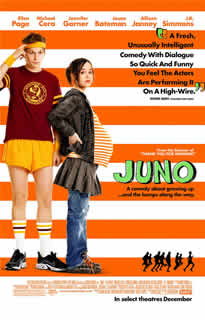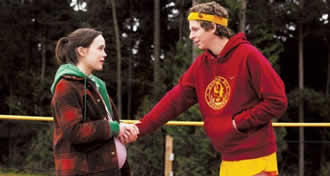In the new film Juno (directed by Jason Reitman who also did Thank you for Smoking and written by Diablo Cody), the main theme dealt with is teen pregnancy. Yet instead of looking down on Juno (played by Ellen Page) for making a ‘mistake’ by having sex at such an early age (16 years old), the screenwriter chooses rather to empower her and show her strength in this situation. We see her grow as she deals with things some people even twice her age haven’t gotten to yet.
We eventually meet the adoptive mother, Vanessa (played by Jennifer Garner) who appears to have her life together, working the 9 to 5, dressing and acting rather structured. Vanessa’s musician husband, who, as most artists go, still hasn’t grown out of his own childhood yet, contrasts her character. Thus, while Vanessa is at first shown as rigid and a bit too ambitious in adopting this child, a key scene where Vanessa is seen playing energetically with a friend’s baby in the mall allows her to grow on us as well as Juno.
Eventually, Vanessa and her husband drift apart (he’s not ready for a family, she’s been ready), and the reality of single adoptive motherhood sets in on both Juno and Vanessa. Yet instead of growing scared, both female characters embrace their dilemma and stand up to their respective challenges. Essentially we are presented with the young and independent pregnant 16 year-old who chooses to take the harder path (having the baby and giving it up for adoption), then passing the child along to an independent single career woman who will undoubtedly work full time at her job and spend the rest of the night caring for her kid.
of single adoptive motherhood sets in on both Juno and Vanessa. Yet instead of growing scared, both female characters embrace their dilemma and stand up to their respective challenges. Essentially we are presented with the young and independent pregnant 16 year-old who chooses to take the harder path (having the baby and giving it up for adoption), then passing the child along to an independent single career woman who will undoubtedly work full time at her job and spend the rest of the night caring for her kid.
In addition, the emotional and physical absence of the male characters (husband and boyfriend) in the film from their female partners makes the women appear even stronger. Thus, Juno, with a ‘bun in the oven’, would lug her books through school and drive herself around in her van, regardless of her pregnancy, as her boyfriend (the father of the child) ran for the track team and lamented over plans for the prom. Similarly, as Vanessa begins to decorate the baby’s room (“nesting” as she calls it) and still goes to work, her husband sits around, plays music and reminisces about the ‘good old days’.
Nonetheless, the male characters do have redeeming qualities, and possibly only appear inept due to a more distant stance that they take in the traditional childrearing process. It is not a lack love for their female partner, but perhaps something more socially or biologically constraining in the parenting process. Juno’s boyfriend, for instance, is able to figure out that Juno is  having the baby when he doesn’t see her after he wins a track race. He humorously, stops for a few seconds after winning and looks for her in the crowd. When he doesn’t see her, he starts to run again, right for the hospital. This scene shows that he loves her, regardless of what his absence could have said. He curls up in the hospital bed with Juno and holds her as she recovers from giving birth.
having the baby when he doesn’t see her after he wins a track race. He humorously, stops for a few seconds after winning and looks for her in the crowd. When he doesn’t see her, he starts to run again, right for the hospital. This scene shows that he loves her, regardless of what his absence could have said. He curls up in the hospital bed with Juno and holds her as she recovers from giving birth.
I think what this film offers that most films haven’t been able to recently is a realistic view. No character is completely bad. No character is completely a cliché. They all have this realness to them. Even the parents, who are shocked at the news of the pregnancy, are still supportive of their daughter’ decision. This makes Juno stand out.
The film is most importantly about Juno growing up, though. A 16-year-old’s life is never easy in High School. Add a pregnancy, and it’s bound to be more stress than most could handle. Juno takes everything in stride though, never short on attitude or energy, and even in her final stages, she nonchalantly walks the halls of the school regardless of the stares at her huge stomach. To me, this is courage. Not just in regards to the pregnancy, but the fact that she made a decision about her life and she is willing to face any consequences that come her way. She doesn’t rely on what people think of her; she does it because she believes that giving this child up for adoption is better for her and the baby’s lives. This strong conviction is far greater than any pro-choice/pro-life debate that could arise from this film’s main theme. It’s not a film about whether abortion should be legal or not. It’s about growing up and believing in yourself and your choices.
legal or not. It’s about growing up and believing in yourself and your choices.
This film is very powerful in its depiction of gender. It doesn’t exaggerate on the shortcomings of the male characters, yet it doesn’t parade the women around as martyrs either. It lets the characters exist in their own little sphere. And because it is completely believable that this cynical and sarcastic 16 year-old can be pregnant, yet still maintain her unique personality, we learn something about our society. The fact that we as spectators are able to believe that a character like Juno could exist in our own world today as a strong and independent female shows us that we as a society are progressing in terms of balancing the genders. While I wouldn’t herald Juno as a role model per se (teen pregnancy is still a serious issue today that many have to deal with, and I wouldn’t wish it upon anyone not ready), I would go so far as to say that Juno’s strength should be admired. More women need to view their independence as an opportunity for growth, rather than banishment to the once-shamed state of being single.

